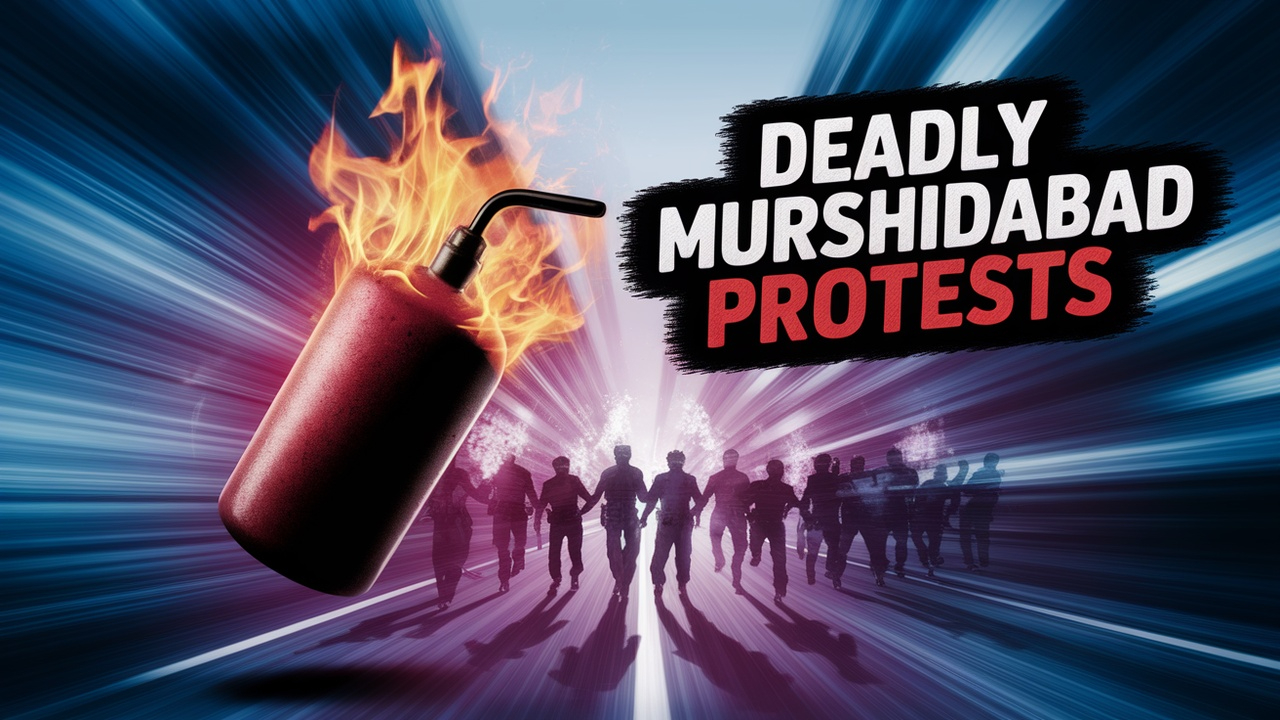Murshidabad Protests Over Waqf Act Turn Deadly Violent
In Murshidabad, West Bengal, three people died amid violent protests against the Waqf (Amendment) Act, resulting in over 200 arrests. Demonstrations turned chaotic, with mobs clashing with police. The unrest highlights communal tensions, exacerbated by political disputes over minority rights. Fear persists as residents seek safety amidst ongoing patrols.

MURSHIDABAD, India — Three people were killed and more than 200 others were arrested in clashes between the police and demonstrators opposing the Waqf (Amendment) Act in Murshidabad district of West Bengal. The clashes broke out Friday as demonstrations became chaotic, with mobs setting vehicles on fire and fighting with the police. They said the tensions were connected to opposition against the new law, which regulates Muslim charitable properties. The unrest has heightened concerns over communal splits in this sensitive border area.
Protests Turn Deadly
The violence first erupted in Dhulian, Suti and Jangipur areas of Murshidabad. Protesters furious over the amendments to the Waqf Act blocked roads and attacked security forces with stones. The police opened fire to disperse the mob, killing three people, including a Hindu father and son and a Muslim man. Several cars, including police vans, were set on fire. The Calcutta High Court directed central forces, like the Border Security Force (BSF), to bring order.
“Fear has gripped people everywhere,” said Rakesh Mondal, a local shopkeeper in Dhulian. Shops are closed, and people have no way of knowing when it might be safe for them to return. More than 200 have been arrested so far, with police promising to track down all those involved. Internet services in Murshidabad, Malda and Birbhum have also been suspended to contain rumors.
Background of the Conflict
The Waqf (Amendment) Bill was passed by Parliament in December and became law on April 8, 2010 and seeks to reform the management of Muslim charitable properties. It has been criticized, including by West Bengal’s ruling Trinamool Congress (TMC), for violating the rights of minorities. West Bengal Chief Minister Mamata Banerjee has declared that her government would not implement the law, which she described as unconstitutional. Her position has led to protests, particularly in Murshidabad, a Muslim-majority district near Bangladesh.
Murshidabad has faced its fair share of unrest. Six years ago, protests against the Citizenship Amendment Act turned violent in this area. The district’s diverse population — 66.67% Muslim according to the 2011 Census — puts it at the heart of communal tensions. Many locals fled to adjacent Malda amid the recent clashes, but police say some have returned, under escort.
Escalating Tensions, Political Finger Pointing
The violence has unleashed a political firestorm. The BJP charged TMC with not being able to protect Hindus, alleging the displacement of over 400. TMC leaders, on the other hand, hold the central government’s law responsible for inciting unrest. Both sides deny provoking violence, but unverified allegations swirl on social media, making it difficult to restore calm.
No major incidents have been reported by police since Saturday afternoon. “We’re trying to restore full normalcy,” said Jawed Shamim, Additional Director General of Police. Nine companies of the BSF patrol sensitive areas. The state government has arrested more than 200 people and lodged several First Information Reports (FIRs). Yet fear remains, and burned-out vehicles and damaged shops pepper the streets of Dhulian.
Community Impact and Fear
The human toll is stark. Families are mourning the three victims, including Chandan Das, 40, and his father, Hargobind Das, 70, who were hacked to death by a mob. Ejaz Sheikh, a young Muslim man, was shot and fatally wounded. Hundreds, they mostly women and children, crossed the Bhagirathi River to reach Malda, looking for safety. In Malda’s Baisnabnagar, a school served as a temporary shelter for the displaced families.
Local leaders call for peace, but trust is broken. “People I know are separating,” posted Debangshu Bhattacharya, a TMC youth leader, on social media. The violence has also attracted national scrutiny, including a Supreme Court petition seeking a probe into alleged targeted attacks. The request has not yet been ruled on by the court.
What Happens Next?
The Murshidabad clashes are a reminder of the challenges involved in balancing reform with community sentiments. The Waqf Act’s goal — to make property management more efficient — has in practice deepened fault lines in a region that is already tense. With political turmoil rocking Bangladesh on its doorstep, officials fear unrest could build if the situation is not resolved quickly.
The first order of business is restoring peace. Police and BSF patrols will continue, and officials are in touch with Malda for the return of the displaced residents. Under pressure to maintain order, the TMC opposes the law constitutionally. Calls by the B.J.P. for stricter measures, including the Armed Forces Special Powers Act, heighten the tension.
The central government might have to clear the Waqf Act’s provisions to dispel apprehensions. Community dialogues might help — if everyone agrees to be calm. For now Murshidabadi’s are waiting with bated breath and the hope of being safe from the hate as well as staying as one. In the days ahead, the question will be whether West Bengal can mend its wounds or whether those divisions will deepen even further.